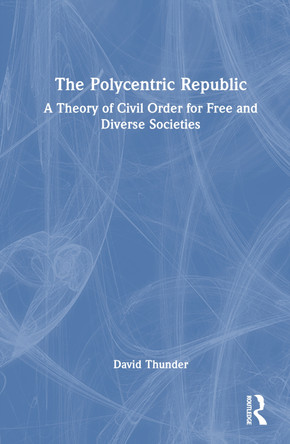Description
Polycentric Governance and the Good Society: A Normative and Philosophical Investigation offers an examination of the idea of polycentric governance as one of the pillars of a flourishing human society. Rather than following the conventional path of suppressing complexity and diversity for the sake of reaching agreement on justice and political stability, David Thunder and Pablo Paniagua see complexity and diversity as assets that should be leveraged to make the "Open Society" a more prosperous, resilient, and flourishing place to live. Polycentric Governance and the Good Society provides valuable food for thought for academics and students looking for a probing, cross-disciplinary discussion of the ethos and institutions of liberal democracy under conditions of social pluralism. Although the volume includes diverse disciplinary lenses, such as public choice theory, MacIntyrean social theory, and constitutional law, the driving concern is to exhibit the potential advantages of polycentric approaches to governance and social coordination for constructing a feasible and morally attractive social order. This is the first extended academic work to explore in depth the advantages, not only from an economic and organizational standpoint but also from a broader ethical, sociological, and anthropological perspective, of polycentric governance arrangements.
About the Author
David Thunder is research fellow in political philosophy at the University of Navarra's Institute for Culture and Society.
Pablo Paniagua is economist and a Research Fellow at King's College London (KCL).
Reviews
"This crucial book provides a comprehensive tour of polycentric governance. By detailing how such systems can manage diversity and conflict within modern democratic societies, it offers a fresh framework for understanding and implementing governance that can effectively respond to the complexities of social and political issues, thus promoting a more equitable and functional society."
-- Jennifer Brick Murtazashvili, University of Pittsburgh"This is a unique contribution that brings together both the practical and the ethical case for polycentric governance. It offers an inspiring ethical vision of polycentricity as a philosophy for life in diverse and complex societies."
-- Mark Pennington, Professor of Political Economy and Public Policy, King's College London"Polycentric governance (PG) goes beyond federalism and separation of powers to fully embrace both the full diversity of human aspirations and the highly complex array of overlapping authorities and informal institutions required to encompass and nurture that diversity. The literature on PG has typically focused on traditional political and economic issues, but contributors to this volume broaden their horizon to consider normative efforts to reconcile plural visions of human flourishing with general principles of justice and social order, and to ensure the 'intelligibility' of overlapping conceptions of law. In each chapter, authors balance the potential attractions of, and legitimate concerns with, each of their proposed elaborations. Personally, I was most enamored with the concept of 'non-territorial polycentricity', but I'm sure all readers will encounter ideas sure to receive careful attention in future works on complex governance."
-- Michael McGinnis, Senior Research Fellow and former director, Ostrom Workshop, and Professor Emeritus, Political Science, Indiana University, Bloomington"Dissatisfied with the conventional view of the state as a centralized unit of power, scholars are currently rethinking its foundations. Elinor and Vincent Ostrom launched the study of polycentric systems, which has gained momentum in the last decade as an alternative framework to think about social orders. Pablo Paniagua and David Thunder pursue Ostrom's agenda and put together a collection of essays from diverse disciplines that might become a fundamental contribution to reimagining the state through the lenses of polycentric governance."
-- Mario I. Juarez-Garcia, Tulane UniversityBook Information
ISBN 9781666951684
Author David Thunder
Format Hardback
Page Count 244
Imprint Lexington Books/Fortress Academic
Publisher Lexington Books
Weight(grams) 513g
Dimensions(mm) 235mm * 157mm * 20mm





